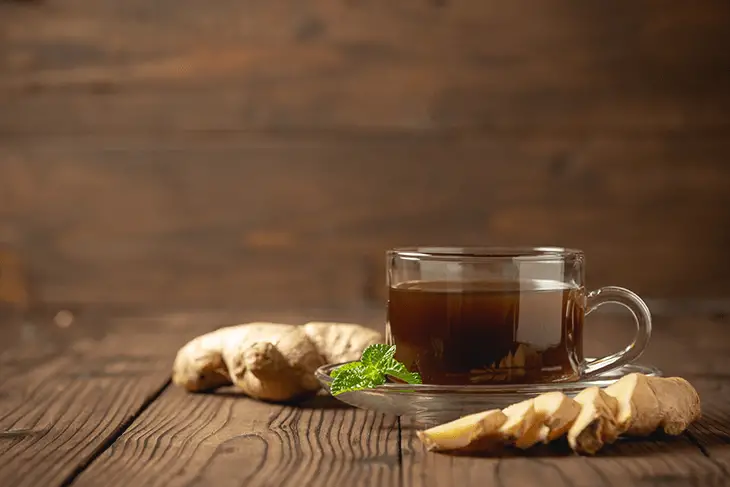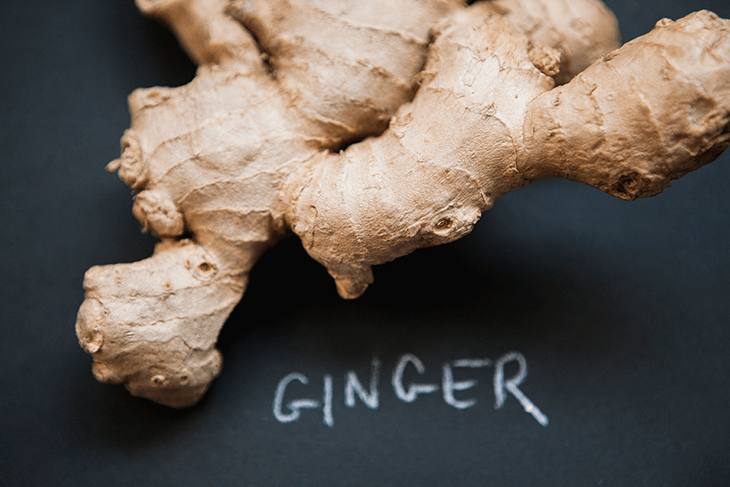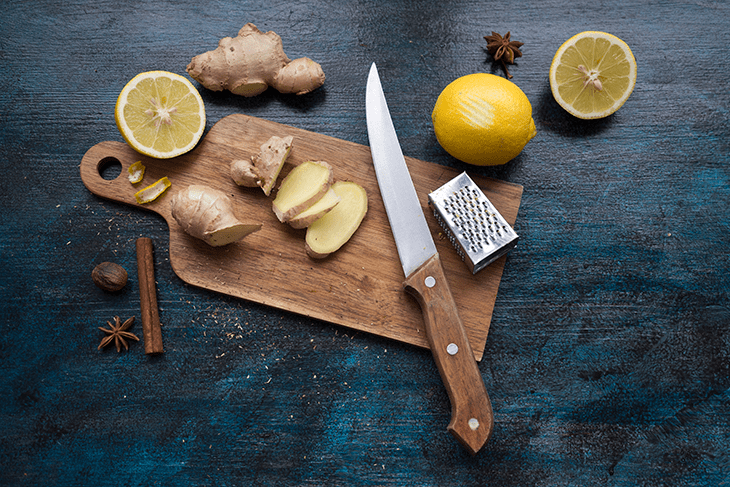
Ginger tea is incredibly versatile and can be made with fresh ginger, ground ginger, or tea bags.
A lot of my clients drink ginger tea for its numerous health benefits. Therefore, I wanted to educate them on all the different ways that you can make this brew, depending on what they were looking for.
In this post, I will cover how to make this brew, the pros and cons of each option, and a lot more. Let’s get started!
Contents
In this section, let’s take a look at the most basic ginger tea recipe that you can follow.
Bring the water to a boil in a saucepan and then add the fresh ginger. Turn off the heat and allow the spice to steep for around 10 minutes. Strain the ginger pieces out and drink. You can add some warm water to the tea if it is too strong for your liking.
Boil the water and pour it into a cup. Add the ginger powder and stir well until it is dissolved. Depending on your desired taste, you can add a little more powder to the tea.
Most tea bag brands will provide you with instructions. It is best to follow these for an ideal taste. Nevertheless, it is often as simple as boiling the water and allowing the tea bag to steep in the water. It can take between 5 and 10 minutes for the tea to reach the desired strength.
If you are wondering how to make fresh ginger tea healthier, there are actually a few different variations to choose from. Depending on your taste preferences and your health concerns, this tea can be brewed with plenty of other ingredients. Here are some of the most common options:

When you are ill, you may want to make a large batch of ginger tea and then drink it throughout the day. If so, there is good news for you – ginger tea can be stored in the refrigerator. However, to maintain its benefits, it is important to consume homemade ginger tea within the day.
When storing the ginger tea, make sure to place the ginger slices used to brew the tea in the drink as well. This way, your tea will continue to get stronger, the longer that it is kept in the fridge. However, make sure to dilute it before you drink it as it may be a little too spicy.
When you want to make tea, there are three ginger sources that you can choose from – fresh ginger, ginger powder, and ginger tea bags. While they may all come from the same plant, they can actually be quite different from one another. Thus, it is important to understand what these variances are to determine which option is right for you.

Let’s first tackle fresh ginger and ginger powder. As the name suggests, fresh ginger is the type that can be found in supermarkets or when you dig up the plant. It must be stored in the refrigerator to maintain its freshness. Even then, it will not remain usable for too long.
Ginger powder, on the other hand, is dried and ground up ginger. Due to this, it can often be stored for longer periods of time, without refrigeration. Most find it quite easy to use as well since you don’t have to prepare it in any way.
Surprisingly, the preparation process for ginger powder means that it is actually higher in certain nutrients. This includes shogoals, which as mentioned, helps to ward off nausea. Nonetheless, it is lower in gingerols which are known for its anti-inflammatory and antioxidant properties.
It should also be noted that ginger powder is also more potent than fresh ginger. Therefore, it is important to use fewer amounts of powder when making tea. Most experts recommend using 1/4th of a teaspoon for every tablespoon of fresh ginger.
Most ginger tea bags contain slivers of dried ginger. However, it can be difficult to know whether it is as nutrient-rich as its fresh and powdered counterparts. This is because each manufacturer uses different ingredients in their tea bags. If you can guarantee that it is wholesome ginger, though, you may be able to get some of the same health benefits with this brew as well.
When selecting ginger tea bags, it is important to check that the bags do, in fact, contain dried ginger. This is because numerous brands simply infuse the ginger flavor or scent with certain tea bags. Thus, you do need to be careful about the type that you select.
As you can imagine, the freshness of the ginger stem can matter a great deal. In the end, it will often be the deciding factor in just how good your tea will taste. Also, fresher ginger is typically more nutritious as well.
Look for stems that have a shiny, tight skin. The brown covering shouldn’t be too thick – you should be able to easily nick it with your fingernail. The stem, however, should be nice and tough. If there are any soft spots, it could indicate that the ginger is too old.
You should also take a whiff of the ginger stem before you buy it. Fresh and potent ginger will have a strong spicy and pungent smell to it. If the aroma has faded, the stem will be of little use to you. Last but not least, look at the cut-off edges of the ginger. It should be a pale yellow/brown color. If there is any green, it means that rot has probably set in.
Unless you will be using up the stem immediately, you will need to store it properly. The exact method will depend on how soon you are planning on using the ginger. If you will be using it on a regular basis, then storing it in the refrigerator in a sealed plastic bag will work.
In case you will be relying on it sparingly, you will need to place it in the freezer. You can then grate it whenever you need it. Freezing the stem will ensure that it will maintain its health benefits, while simultaneously prolonging its lifespan.
Before you can begin to make your ginger tea, you must prepare the ginger properly. This means removing the brown skin. It should be noticed that in good, fresh ginger, the skin is quite thin. Therefore, you need to be careful in scraping the stem too hard and removing some of the ginger as well.
This is why it is best to use a rounded spoon to scrape the peel off the ginger. This way, you can avoid cutting into the stem. Still, you shouldn’t put too much pressure or you will end up scraping the stem during this process.
Now, you have two options with how to prepare your ginger. You can either slice it or grate it – it is up to you. Keep in mind that if you do grate it that you will need to use a strainer to remove the pieces before you can drink the tea.
When slicing the ginger, try to keep the slices as thin as possible. This will make it easier for the water to draw out more flavor and nutrients. As a result, you will end up with a stronger and healthier cup of tea.

As mentioned, this drink has numerous health benefits. Thus, drinking ginger tea regularly can help to ward off a number of medical conditions. At the very least, it can treat certain ailments.
One of the more impressive ginger tea benefits is that it may be able to reduce the risk of some types of cancer. Research has shown that it is capable of fighting cells associated with pancreatic and colon cancers. Ginger tea is also quite useful if you have already been diagnosed with these conditions.
The next remarkable benefit is that this beverage can actually protect against heart disease and heart attacks. This is because it offers up the following advantages:
Ginger tea can also be useful to individuals with diabetes. The drink has been known to reduce insulin, triglycerides, and A1C levels. Simultaneously, it manages your blood sugar level as well, providing even more health benefits.
There are quite a few antioxidants present in ginger tea. These are useful in boosting your immune system and making it easier to fight off various infections. It can also help to reduce stress, which is often a factor in compromising your immunity. Ginger tea is often drunk when experiencing nasal congestion or respiratory issues as a result of colds or allergies. Even simply inhaling the scent of ginger tea can act as a decongestant. Drinking tea has been known to soothe sore throats.
Related Articles
Brews for Your Burden: The Best Tea for Sore Throat Relief
Tea for Allergies: The Best Brews to Cure Your Sniffles
One of the main causes of pain in the body is a direct result of too much inflammation. There is now scientific evidence to show that ginger tea helps to greatly reduce inflammation. As a result, you may be able to experience relief from arthritis, menstrual cramps, headaches, sore muscles, and more.
Related Articles
Bloody Hell! Can Tea Delay Your Period?
Perhaps the most common use of ginger tea is to alleviate nausea. Experts have discovered that compounds called gingerols and shogaols in the drink can reduce the feelings of nausea stemming from pregnancy, chemotherapy, or other issues. It is especially useful when patients are allowed to take other times of anti-nausea medication.
It is very rare to notice any side effects when drinking ginger tea. This is because most people don’t consume nearly enough to experience a negative impact. Still, it is best to stick with one or two cups of tea a day. As a whole, you shouldn’t consume more than 4 grams of ginger in one day.
It is a good idea to ask your doctor if you are planning on drinking ginger tea on a regular basis. This is especially important if you are pregnant, have a bleeding disorder, or have been placed on medication for clots.
Ginger tea may also cause stomach upsets or minor heartburn in certain individuals. So, it is best to always test out weaker doses of tea before gradually increasing the strength. This should help you to avoid any digestion issues.
If you would like to brew the perfect cup of ginger tea, then this is what you need to know about the process. From picking out the best type of ginger to steeping it well, all of these tips will help to make a difference. Thus, you should definitely keep them in mind the next time that you have to make some ginger tea.
